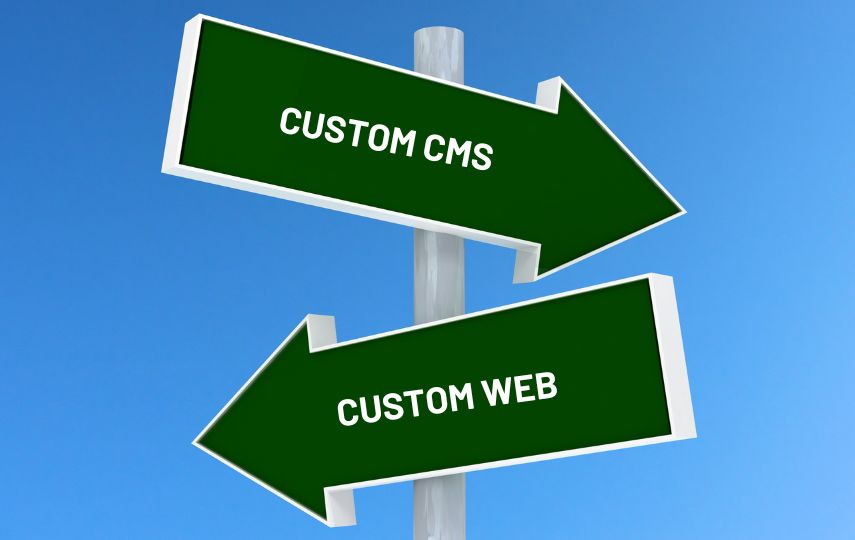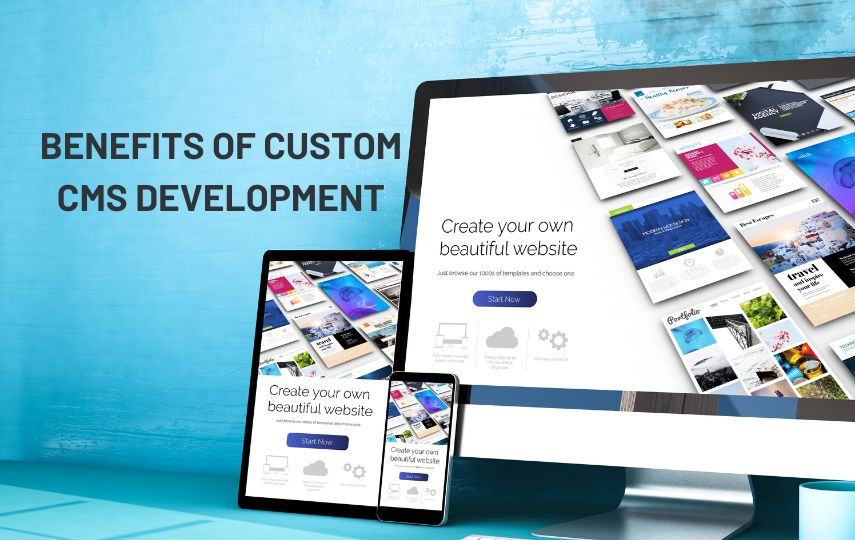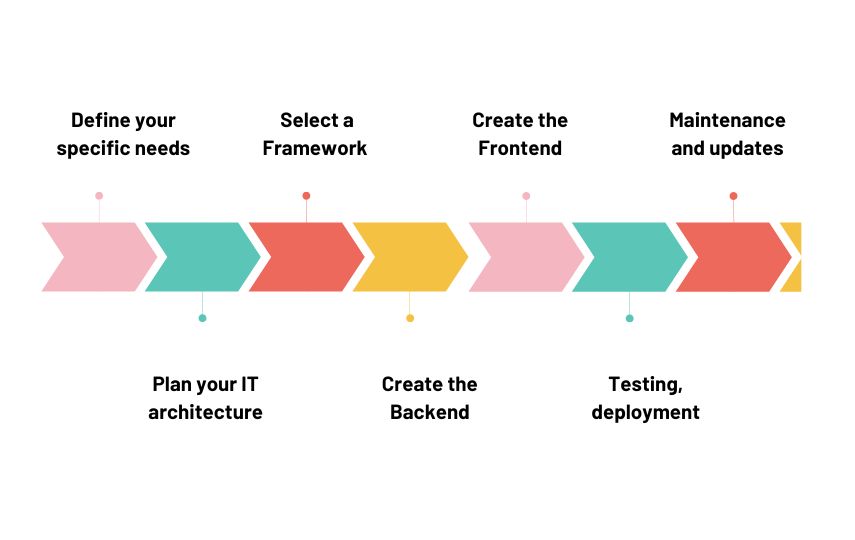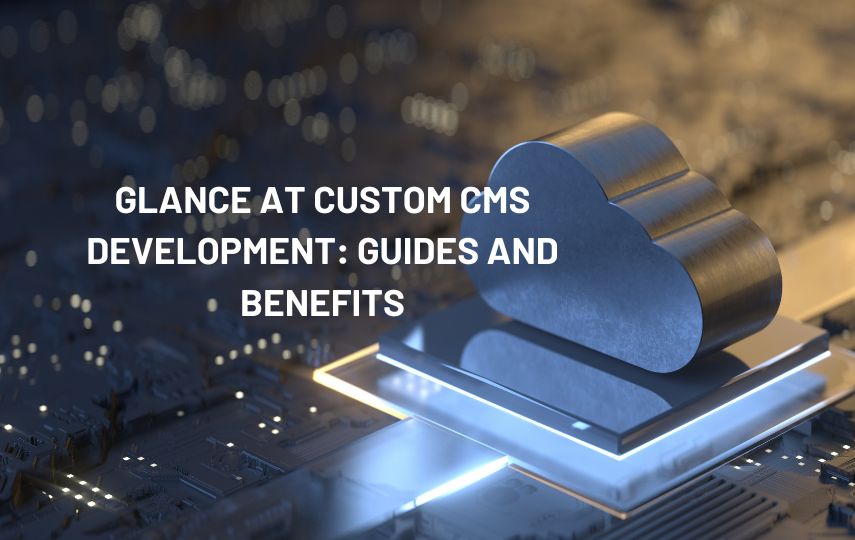TABLE OF CONTENT
Custom CMS Vs Custom Web
Benefits of Custom CMS Development
Guides of Custom CMS Development
Conclusion
Custom CMS Vs Custom Web
Both custom CMS and custom web have different features and functionalities. You need to know the difference between custom CMS vs custom web to avoid confuse when implementing a custom CMS development process. It is clear that businesses choose software solutions based on what they bring and what they need. Here, we will compare custom CMS vs custom web to help you clearly understand them:

- Brand Identity: As we know, CMS provides a set of themes and templates, allowing you to create and customize to meet your brand. However, it seems that it has a few limitations for modification and your website may be similar to other websites using the same themes or templates. Therefore, it is difficult for you to enhance your brand identity. On the contrary, you can easily control and design your website adhering to branding if you use custom web. Your designers will produce a unique, custom look that matches your business identity. This results in enhancing the different impressions with customers.
- Functionalities and Features: Although CMS platforms provide a variety of integrated features and functionalities with modules, extensions, and plugins, they still have limits. Possibly, it is not true that all of them will be available for your unique CMS and website. Meanwhile, the custom website allows you to implement any functionalities and features through open-source CMS development. Thus, you can create a personalized, user-friendly interface that adapts to your specific requirements.
- Technical Knowledge: Emphasize no-coding, CMS platforms make navigating and simple for the users to administer and update their website. Besides, several queries like customized features or fixing difficult problems possibly need technical skills to handle like the custom web. So, you need to hire a qualified developer or IT team to complete tasks. If you don’t have in-house developers, you can consider hiring CMS developers from AHT Tech, who have vast expertise and experience to customize CMS development.
- Support and Updates: Generally, CMS platforms release several updates to keep the system current. CMS providers constantly receive customers’ feedback through forums, customer care, and documentation to create new points. On the other hand, your development team of custom web will follow to upgrade, maintain, and support you to run the CMS system. Moreover, you can receive assistance when the CMS system has errors.
Benefits of Custom CMS Development
Managing content with the CMS platform brings more advantages for businesses. However, sometimes CMS platform is not adaptable to several business requirements. Therefore, they need to find other methods. Custom CMS development is known as the coding-participated process to create the niche CMS system. Let’s browse a range of benefits when developing a custom CMS:

- More effective functionality: Custom CMS development allows you to integrate features and functionality flexibly, meeting your specific requirements. Because custom CMS is developed end-to-end, it is not limited to a set of built-in features, functions, and plugins. It is easy for you to create or integrate a variety of functionality through coding.
- Improved Performance: As we know, pre-built CMS platforms are designed for various audiences, so it is quite difficult to adapt to all segments with all functions. Meanwhile, custom CMS development enables to you customize, reduce useless code, and add features the clients need. This results in optimizing a website, increasing the loading speed site, SEO, performance, and rankings.
- Advanced Security: There is no doubt that only the development team has authority access to the code of custom CMS, unlike off-the-shelf CMS. This enables to you avoid cyber attackers or scams. Developed end-to-end process, custom CMS ensures that your CMS system is applied to advanced security features.
- Intuitive UI/UX: Adhering to your specific requirements, your custom CMS development team will design a CMS system based on your brand identity guidelines. Make sure that the CMS system has a user-friendly and navigated interface to help users easily onboard as well as complete tasks quickly.
- Higher Scalability: There is no limit to scale with custom CMS because this solution is developed with detailed plans and strategies. Therefore, the experts will predict the future demands when businesses grow. Keep in mind custom CMS development always allows you to customize and expand this system because the whole of the development process is controlled.
Guides of Custom CMS Development

Step 1: Define your specific needs
Before developing a custom CMS, you need to identify what you need for a CMS system. There are several basic requirements you need to make clearly in the requirement specification including intuitive interface, content capabilities, content organizations, user roles, track, etc…It is a significant step to help you demonstrate basically your custom CMS. Additionally, you should also estimate the budget for each phrase to control investment.
Step 2: Plan your IT architecture
In this step, you need to choose IT architecture for custom CMS development. CMS requires a database to store content and users, so you should choose power architecture to run smoothly. For example, PHP is a prime server-side programming language for creating dynamic web pages. And, MVC architecture is a popular architecture for building a custom CMS in which data, presentation, and application logic are separated. You can choose either the popular types or other IT architectures if they are good for your CMS.
Step 3: Select a Framework
CMS framework plays a vital role in collecting libraries and tools to create web applications. There are several popular frameworks for building a custom CMS like Larvel, Symfony, CodeIgniter, CakePHP, etc…You need a strong framework which adapts to your needs as well as your developer’s skills.
Step 4: Create the Backend
The backend takes responsibility for managing content and authorized users in the CMS system. Building the backend of custom CMS development is to create content and manage user roles more effectively. Through creating a database schema, you can store user accounts and content.
Step 5: Create the Frontend
As one of the essential parts of user experience, you need to build a CMS frontend with a user-friendly and easy-to-use interface, allowing users to create and edit content quickly. Additionally, developing the frontend also affects to display of content on the website. HTML, CSS, and JavaScript are often used to create the frontend.
Step 6: Testing, deployment
Certainly, there is no system that will be perfect first, so it needs to be tested. Make sure that your custom CMS is responsive and user-friendly on various browsers and devices both desktops, laptops, tablets, and smartphones.
Step 7: Maintenance and updates
You need to maintain regularly to keep your CMS secure and up to date. If your CMS is obsolete, it will cause security patches, and bugs as well as slow. Your developers should monitor CMS performance to find out issues on time. They can use tool like Google Analytics to track user behavior and pain points to improve.
Conclusion
Start custom CMS development if you want to create your unique CMS to manage content. With custom CMS, you can receive more advantages such as customizing the CMS system with code directly, improving CMS performance, and much more. However, many businesses face the challenges of implementing custom CMS development. If you want to develop a custom CMS, the article is for you. AHT Tech is a custom CMS development company, that provides a pool of talented developers to help businesses in developing effective CMS systems. Contact us now!



